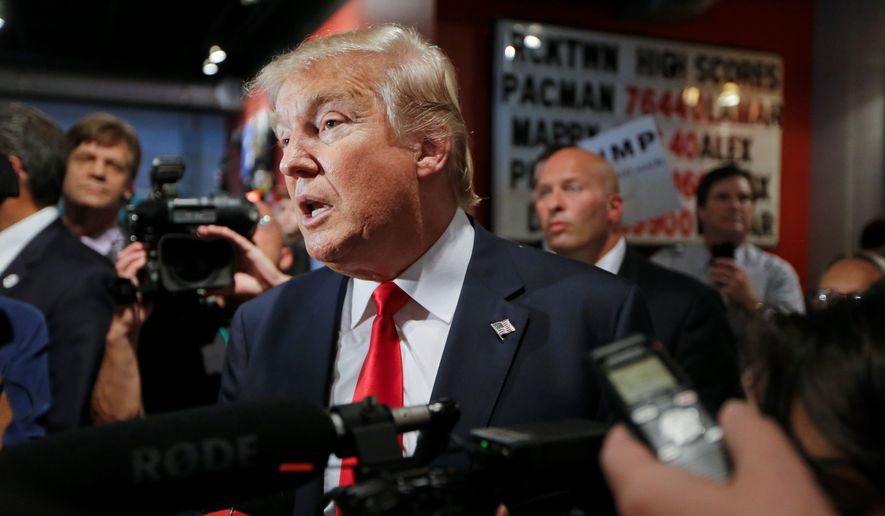Tea partyers are torn over Donald Trump, applauding the way he has shaken the Republican Party establishment with his bombastic style and vows to eviscerate the political class in Washington, but wary of his less-than-conservative stances in the past and his friendly ties with the Clintons.
The billionaire businessman’s meteoric rise to the top of the Republican presidential field, including among self-identified tea party supporters, has obscured some of those questions, but leaders of the grass-roots movement say Mr. Trump’s past will get more scrutiny in coming months.
“Tea partyers are now considering him a serious contender, and they are starting to ask more presidential questions,” said Ken Crow, a tea party activist and Trump supporter in Iowa. Mr. Crow contends that the key for the Republican front-runner now is to establish a level of trust with voters who feel they have been burned repeatedly by politicians who promised but never delivered on limited-government principles.
“If he can win that trust, he will go all the way. If there are more questions unanswered than answered, then he has a problem,” Mr. Crow said.
With a solid foothold as the party’s front-runner, Mr. Trump is increasingly facing attacks from other candidates — and none more so than former Florida Gov. Jeb Bush, whom Mr. Trump bumped from the lead.
On Tuesday, Mr. Bush’s campaign released a Web video showing what it called the “Real Donald Trump,” replaying statements he made in the 1990s supporting a single-payer health care system for the U.S. and plaudits to President Obama’s stimulus package in 2009.
Mr. Trump is open about his policy changes, saying he has “evolved on numerous issues” including health care, abortion rights and a 14.25 percent tax on the rich that he once argued could help solve the nation’s debt problem.
A recent Quinnipiac University poll showed that Mr. Trump is the top choice of tea partyers, pulling in 25 percent, compared with 21 percent for Sen. Ted Cruz of Texas and 8 percent for both Sen. Rand Paul of Kentucky and retired neurosurgeon Ben Carson. Mr. Trump also is outpacing his rivals among tea partyers in Iowa and New Hampshire, hosts of the opening nomination contests.
Those numbers doesn’t sit well with some of the movement’s leaders, who say Mr. Trump is not one of them.
“People are just so ignorant, and I hate the idea that some people would supposedly think that he is a tea party supporter,” said Jane Aitken, a member of the New Hampshire Tea Party Coalition. “It is low-information voters on the conservative side.”
Mr. Trump is making overtures to tea party voters, announcing plans to join Mr. Cruz at a rally in Washington next week hosted by Tea Party Patriots to express opposition to Mr. Obama’s nuclear deal with Iran.
Taylor Budowich, of Tea Party Express, said voters are interested more in what Mr. Trump and the rest of the field have for solutions to the nation’s problems.
“He has branded himself as the epitome of the outsider. That is one of his central themes, and it is central in capturing that [voter] frustration with the political class. But then you have to lay out your plan and platform and be serious about it,” Mr. Budowich said.
So far, Mr. Trump has released a detailed immigration plan, and a proposal to overhaul the nation’s tax rates is due in coming weeks.
Asked whether Mr. Trump can win over tea partyers, Mr. Budowich said anything is possible at this point in the race.
“For instance, [Ronald] Reagan was a Democrat, and he was unpopular for that, and then he became a Republican and then became a pretty conservative Republican in supporting [Barry] Goldwater,” Mr. Budowich said.
He added, however, that Reagan’s transformation happened over decades while Mr. Trump will have a tougher time convincing voters that he has suddenly become an authentic conservative.
Joe Duggan, South Carolina Tea Party coalition founder and executive producer, said he is more willing to cut Mr. Trump some slack over his changing views than he would an elected official.
“A politician who says one thing and acts a different way to me is not worth that much,” Mr. Duggan said. “But a businessman I can almost justify it a little bit more, in that when he said things a certain number of years ago he was talking as a businessman and negotiating deals and so forth — and in playing that role, his primary goal was winning a deal and not sending out the message.”
Mr. Duggan said Mr. Trump has his shortcomings: “I am convinced that he stands for some of the tea party principles. I am not totally convinced that he stands up for all of them.”
Still, he said, having Mr. Trump in the race has been good for the tea party because it is drawing a lot of attention to the movement’s positions.
“He is doing in a very short time what we have been trying to do for six years — and that is to get the message out,” he said.
• Seth McLaughlin can be reached at smclaughlin@washingtontimes.com.




Please read our comment policy before commenting.